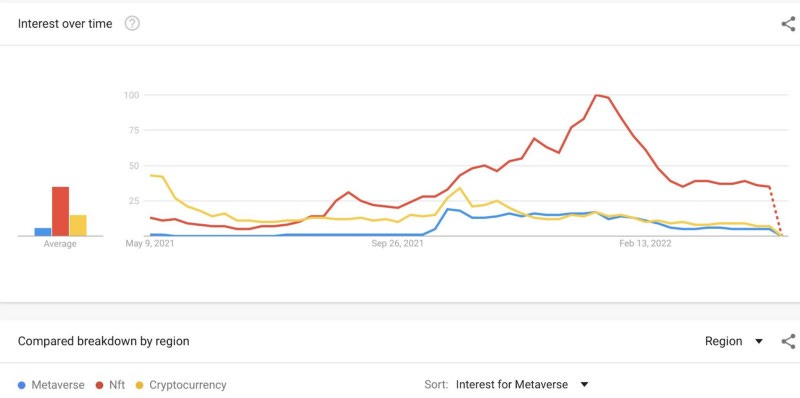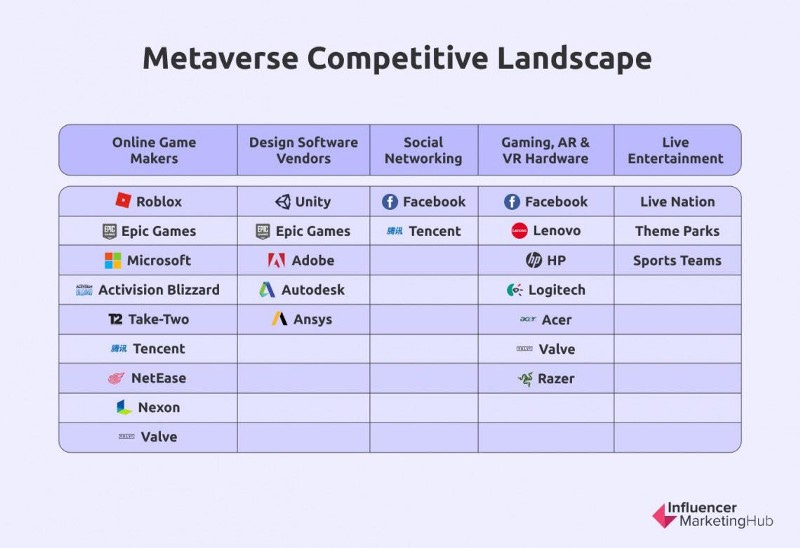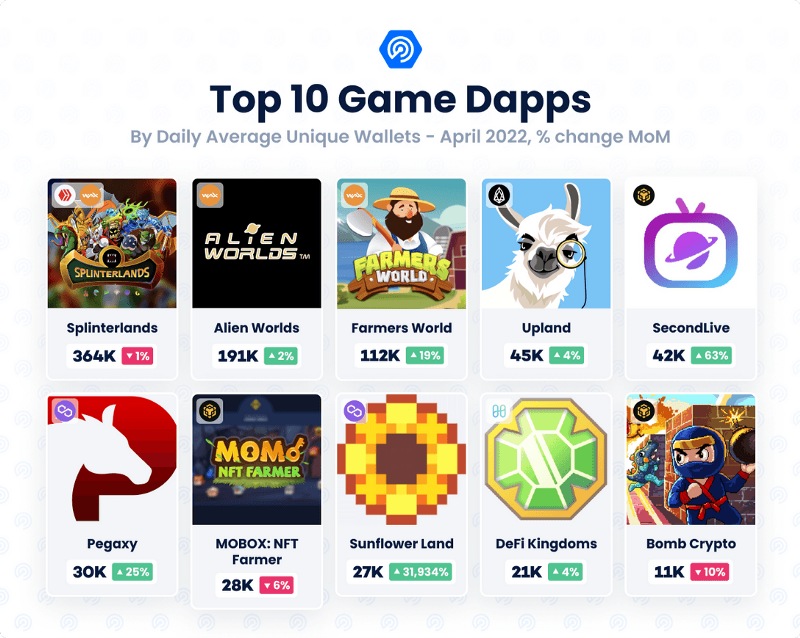Why We Invested in Duelist King
Duelist King is a blockchain-agnostic online NFT card game platform that aims to champion tokenization and democratization of card games.
To Be Or Not To Be a Gaming Metaverse
Every day a new metaverse is launched with great aspirations to create an interconnected 3D virtual world. Unsurprisingly, gamers continue to be the early digital pioneers and most active users of these virtual lands where the physical world commingles with augmented and virtual realities — an ideal immersive space for PvE and PvP battles in lost kingdoms, netherworlds, and ancient battlefields.
Since Facebook introduced its virtual workspace Horizon Worlds and rebranded as Meta in October, the metaverse has captured the broader consumer imagination. Google searches for the metaverse have been as popular as those for the cryptocurrency on which these virtual economies run.
Searches for NFTs, the main driver of interest in the metaverse, are even higher. NFTs allow players to own their game, including their avatars, game items, land, and apparel like running shoes. The metaverse provides a potentially infinite market to monetize these digital assets.
As retail, entertainment, business, and virtually all aspects of our lives establish a presence in the metaverse, analysts are bullish on the potential value. Statista forecasts the possible market opportunity of the metaverse to be between $3.85 trillion and $12.46 trillion, based on a growth forecast of 10% to 50%, respectively.
With an explosion in gaming metaverses, gamers, investors, and NFT collectors have many choices. Among the criteria to consider, from the sales ranking of NFT game items to metaverse property appraisals, interoperability is becoming a non-negotiable feature.
Gaming & Interoperable Metaverses
So when deciding which games to play or invest in, first ask, can you trade game assets across games and chains? That is the question more gamers are asking.
Today, most decentralized application (DApp) developers will not develop dApps for a blockchain unless it is interoperable and scalable, providing access to the potentially limitless marketplace the metaverse offers. Consequently, interoperable blockchains were the most active in April 2022, according to DappRadar’s monthly report, based on a growing trend in which “games fuel the industry’s activity” and equal 52% of the industry’s unique active wallets.
Cross-chain solutions fall into two camps. Layer 1 solutions like Solana, the Binance Smart Chain (BSC), Avalanche, or the upcoming Ethereum 2.0 upgrade use parallelization solutions (e.g., sharding) to process more transactions more efficiently and faster. Layer 2 solutions are ways of building bridges across chains by, for example, deploying sidechains (Polygon, NEAR) or using ZKP rollups (STARKEx, Optimism) to exchange assets and data across blockchains and smart contracts.
The top 25 blockchain games run on interoperable blockchains, including WAX, BNB, Polygon, Harmony, ThunderCore, and Avalanche. On these blockchains, metaverses have the potential to exchange data and assets across a much bigger world than even that of Facebook.
Many analysts do not fully understand the metaverse. Consider the following chart by Influencer MarketingHub. We find big companies with ambitions to become metaverses, but most are not even on the blockchain and cannot provide cross-chain services. Some of them do not have ambitions to become blockchain-powered platforms, even though the blockchain is believed to be the infrastructure of Web 3 and the metaverse.
Roblox has been an early mover adding a PlayDapps NFT market on the Polygon and Ethereum blockchains to its popular gaming ecosystem, with over 6,000 active monthly users. Notably, leading game engine Unity has added a blockchain plugin compatible with Ethereum and Polygon. Interoperable gaming leader The Sandbox and NFT-based metaverse crypto game Bomb Crypto, a top game on the Binance Chain, have been built using Unity.
Others are making considerable investments in the blockchain. Epic Games, the maker of the popular Fortnite games, raised $2 billion from Sony and Lego’s parent KIRKBI in April to build its metaverse, valuing this yet-to-be-built metaverse at $31.5 billion with plans to join a multi-trillion-dollar part of the world economy. Tencent has made a significant investment in Immutable X’s ZK rollup game platform.
Others naively think they can ignore the metaverse. Steam’s Valve has blocked NFTs, and Action Blizzard has recently tweeted that no NFTs exist on its platform.
Interoperable Gaming
Today, the only games offering true interoperability operate on the blockchain, and the number is growing rapidly. The number of active blockchain gaming DApps has increased 22% since mid-January to 487, and the total number of gaming DApps jumped 32% to 1,560, according to DappRadar. The momentum in the growth of online activities is led by gaming. In 2020, the online gaming market grew 21.9% to $21.1 billion.
The interoperable blockchain is motivating the development of cross-chain dApp innovation and cross-industry innovation. The most dominant of this trend is GameFi — the integration of gaming and DeFi, followed by SocialFi. Further consider that today’s one billion gamers can significantly increase their gaming assets through various blockchain-enabled strategies, including:
Buying, selling, and upgrading NFTs
Staking and farming NFTs and tokens and other GameFi strategies
Any virtual assets you own — land, game items, and so on — could potentially be sold to players in other games.
The Duelist Kingdom of Metaverses
With the Duelist King platform, players can trade their cards across games. Each card is an NFT giving the player verifiable and irrefutable ownership. By tokenizing online card games on the blockchain, Duelist King provides benefits to owners of the 500,000 cards already sold, including:
Insulating players from rampant forgery and fraud in the card collectibles market by recording authenticity on the blockchain
Enabling players to buy, sell, transfer, and upgrade cards authenticated by cryptographic proof
Allowing cards to be traded across other games and blockchains
The blockchain-agnostic NFT card game was also built to enable trading across other chains and is currently linked to the Binance Chain and Cardano and is also supported by Polygon and Cronos.
The number of games is quickly expanding because, on Duelist King, the gamers own and create the games.
In each round, 20 unique cards are dealt of 5 million cards in circulation. Each card is classified according to one of six rarity levels, from Legendary (L) to Common ©, with only 2,500 copies available of the rarest L. Players can buy the cards in loot boxes of 5 cards with rarity randomly assigned.
As a decentralized autonomous organization (DAO), all aspects of the DKDAO platform are democratized and decentralized on the blockchain to ensure transparent and provably fair gaming. How players buy, collect, play, trade, and earn in games is governed by smart contracts, and ultimately the community will propose and vote on the smart contract terms.
Duelist King cannot tamper with the algorithm or results, unlike centralized gaming companies. They are transparently recorded on the blockchain. The use of random numbers on the blockchain has ushered in a new era of provably fair gaming that instills trust back into the online gambling and gaming sectors. However, verifying the results of the coin-tossing protocols can be computationally expensive, especially as the number of users increases.
Duelist King’s Decentralized Random Number Generator (DRNG) based on the Scalable Randomness Attested by Public Entities (SCRAPE) model provides a scalable random number processing solution that is computationally more efficient and significantly cheaper and faster. At the same time, the decentralized random number generator ensures immutability and security to protect the results from being manipulated.
The Duelist King Oracle then takes over. The hashes of the random values are committed to a smart contract providing immutability and auditability with cryptographic proof.
NFT Card Game Growth
According to Gartner, by 2026, 25% of people will spend at least one hour a day in the metaverse. If we take that slice from the projected 5 billion internet users in 2026, about 1.25 billion people will be spending money in the metaverse in four years. A critical difference from today’s e-commerce market is that revenue will be going to the user-owners as stakeholders of the decentralized platforms instead of a centralized owner like a Facebook or Tencent.
Many players, investors and collectors are essentially investing in one virtual 3D store in the metaverse — one location in the metaverse — where their profit potential is limited to those in the neighborhood who shop there. Sure, a few people may teleport in and join, but the game asset monetization potential is stuck in that neighborhood at one location in space.
Or they can invest in an interoperable gaming platform like Duelist King, opening up the opportunity to a potentially Amazon-sized market on an interoperable gaming platform that can sell game assets across all the corner shops (aka bodegas, for those of you that live in NYC) in the metaverse. This potential may explain why more than 25,000 people registered in advance for the Duelist King Alpha 2.0 version launched on April 15th. Duelist King forecasts its card sales to reach roughly $40 million.










